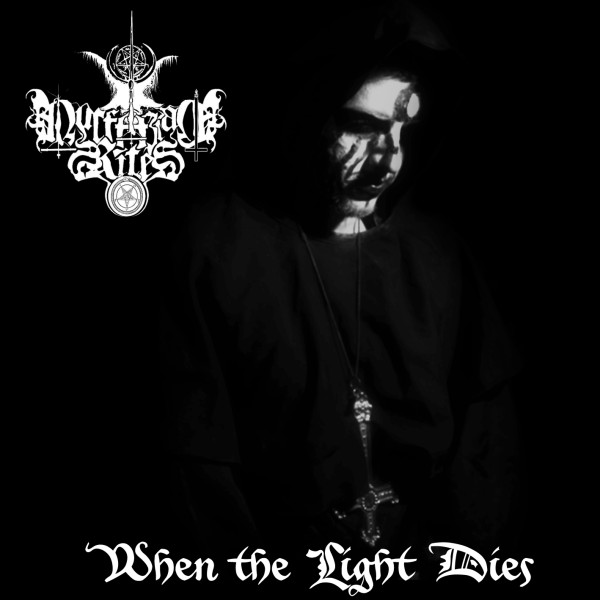Luciferian Rites play black metal in a style that at first calls to mind middle-period Graveland. The hand-strum technique outlining chords is also in line with Immortal’s At the Heart of Winter and less obviously with Burzum’s technique. Immortal haunts this monument of an album in its most aggressive parts, but it is the commanding voice of Fudali that we hear echoing through the halls. Once the first impression has passed and the inventory of recognizable influences has been done, though, the individual beauty slowly comes out. It does not reveal itself, as this is very subtle music. It is the listener that must tune in, must hang on to the song, the album, and hear as every inseparable and utterly dependent — and necessary — part of its construction works together to create the transcendental black metal experience.
Drums play an incredibly important role here, lending an eloquence not even Immortal or Graveland, from whom Luciferian Rites borrow their musical language, show. The Achilles’ Heel of When the Light Dies is that songs start and end in strong statements that only serve as such because nothing comes before or after them, respectively. After a song starts, though, it is carried through a seamless transition of sections whose single riffs appear to be the most simple but that brought together create a magnificent super-riff. This could go on and serve as the song itself, but the band will often take a break in the middle, only long enough so that it counts as one. Unlike most other bands who use this structure, Luciferian Rites does not do this as a means to restart a song that has ran out of gas. Instead, in this brief moment the listener’s attention is brought back from the stupor of the first part of the song into conscious focus, only to renew the journey.
Some will say this album is seen in a positive light on this site because it adheres to old school precepts. Simple-minded people prefer simple explanations, it relieves them from the burden of having to think analytically. The truth is much more complex. Luciferian Rites excels in the subtle art of coherent, sensible, and purposeful composition, independently of the style. In their effort to find simple explanations and excuses not to have to face judgement and challenge their own views and the status quo, composition choice is equated to musical style. To some degree this is true, some styles have been built upon essentially flawed concepts (see Deathcore). But it is not true to the extent that we excuse bad composition by calling it stylistic difference, because “we are just different, but no one is superior”. This misplaced humanitarian impulse drives art to starvation and highlights gimmick and novelty acts as the masses of casual listeners turn their heads towards momentary satisfaction.
When the Light Dies is a strong candidate to the Mexican metal pantheon, standing in quality besides the best of legendary countrymen Avzhia and Cenotaph. Calling to mind the sensibility of Ancient’s Svartalvheim, Luciferian Rite’s sophomore release expertly builds on the classic works, sweeping aside accusations of retro-worship in a confident gesture of originality.
Tags: 2015, Ancient, At the Heart of Winter, Avzhia, Black Metal, burzum, graveland, immortal, Luciferian Rites, mexico, Svartalvheim, When the Light Dies



So are modern black metal bands often attacked for doing “retro-worship”? I know retro-death bands are ripped into pretty hard (and rightfully so) but black metal is even more conservative of traditional techniques in drumming/guitar/vocals so it seems like an unfair criticism in the first place. Like you say, David, the way to judge black metal should be by focusing on the coherence of the composition but also on the ability to excite thoughts and moods. Lots of modern black metal excites a mood (anger, or melancholy) but then that’s all it does, which is boring.
This song is pretty good so far, then, in that it is very emotive without being indulgent; the lighter-sounding melodies are reigned in before they become syrupy. I got a strong Sacramentum vibe around 2:45 and that give me a tingly feeling in my pants.
>So are modern black metal bands often attacked for doing “retro-worship”?
Yes, they are. Half of the bands are clones of some important famous band like Darkthrone. And I do not mean “modern black metal band” as in “playing a modern style”, I mean current or new bands, btw.
> Lots of modern black metal excites a mood (anger, or melancholy) but then that’s all it does, which is boring.
My impression of the album as a whole was very good,not only mood-wise. I agree that section-wise, even a single song by itself, does not sound that impressive at first.
This is a good album. Stylistically it sounds more like Finnish bands like Sargeist, but the composition is much more refined.
Sounds like an honest effort… but Black Metal already has its candle holders at the moment.
Interesting comment. I do not think “candle holders” is a job placement to be filled.
There is a lot of stuff that sounds good or interesting. The only black metal album I’ve heard actually ripping through and getting a classic status is Sammath’s Godless Arrogance.
Who are you thinking about?
Strong riffs. Vox could use some improvement but very good overall.